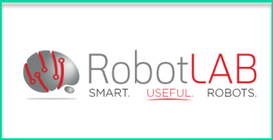unlock STEM and coding skills in students of all ages

Engage! K-12 currently houses a wide variety of lessons focusing on subjects or concepts that students often struggle with. Lessons are searchable by grade level, subject, and CCSS or TEKS standard, and cover topics from coding to STEM to storytelling. Teachers can use RobotLAB’s existing lessons, customize them for their classes, or create their own. Each lesson leads students from idea to construction to application to results.
Every lesson is designed to spark students’ curiosity and use this engagement to teach them the subject at hand. For example, a lesson that combines coding and algebra begins with the teacher showing a video of humanoid robots playing soccer. The question “How do the robots know where to kick the ball?” leads to a discussion of using linear equations to solve the problem at hand.
Students then use integrated tools such as drag-and-drop programming and a graphing calculator to help them manipulate virtual robots to kick the ball to the goal. They can then receive immediate feedback by watching their commands played out by physical robots. Schools have the option to add their existing robots to the online lessons or choose the budget-friendly Simulation Mode of Engage! K-12, which uses virtual robots only and allows students to learn from anywhere.
Engage! K-12 includes classroom-management features, student assessment, and themed lesson plans for different grades, enabling schools to easily integrate it “out-of-the-box” into their curricula. Engage! K-12 also includes interactive tools to enhance the learning experience in the classroom, such as a customizable polling system that allows students to share answers and teachers to instantly find out what concepts the class has and hasn’t grasped. Students’ responses are translated into a word cloud to stimulate class discussion and collaboration.
“Educational robots have been on the market for quite a while, but they haven’t had the curriculum teachers need,” said Elad Inbar, the CEO of RobotLAB. “Just like with stoves: if you read the user’s manual provided by the manufacturer, you’ll know what buttons to push to turn them on and off, but that doesn’t make you a chef. You need a recipe book to succeed in cooking. Our lessons are the recipe for success. Our goal is to make Engage! K-12 a platform that empowers every teacher to use the natural curiosity about robots to engage any student in any age group to learn any subject.”
At the upcoming TCEA conference, RobotLAB will use humanoid robots and its newly introduced autonomous-car program to showcase curriculum for K-12 programming and coding, high school algebra, and elementary school storytelling.
To experience Engage! K-12 in person, you can visit booth #1829 or make an appointment at the PR with Panache! Storytelling Suite.
To arrange an online demo of Engage! K-12, please visit RobotLAB.com/EngageK12.
About RobotLAB
Created by teachers, RobotLAB’s award-winning, standards-aligned K-12 programs help students develop 21st-century skills such as problem-solving, critical thinking, and collaboration, all while learning computer science and core subjects in a fun and engaging way. RobotLAB’s lessons appeal to all grade levels and cover elementary reading, writing, and math; middle school pre-algebra, geometry, and algebra; and high school trigonometry, calculus, and programming. RobotLAB has been named “Best Ed Tech Company” at SXSWedu, won the Gold Medal from the Edison Foundation, and been honored as an Educational Game Changer. We make abstract math and computer science real by focusing lessons on complex problems that become intuitive through manipulation of virtual and physical robots. For more information, please visit RobotLab.com.












